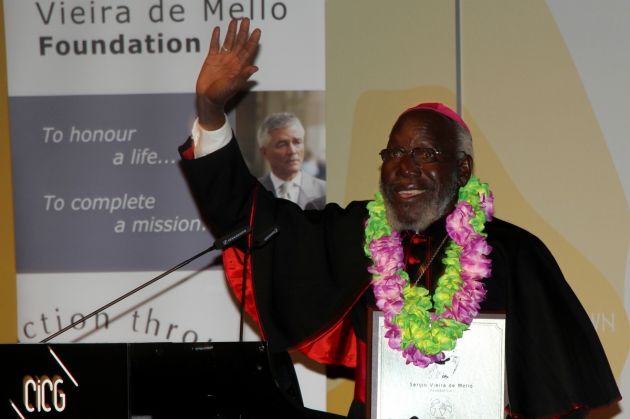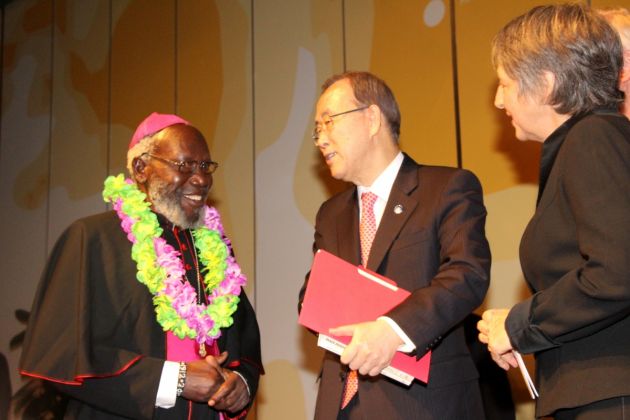UN chief urges Security Council: break silence on Syrian slaughter

Geneva – U.N. Secretary-General Ban Ki-moon says the Security Council "must no longer stand as a silent witness to the slaughter" devastating Syria which has left close to one million refugees.
"It must come together and establish the parameters for the democratic transition that might be the last best hope for saving Syria," said Ban.
Ban's plea came while delivering a lecture at a peace prize-giving ceremony for a Roman Catholic bishop from the world's youngest nation, South Sudan, who retired to set up a peace village settling clan and sectarian conflicts.
The 15 member U.N. Security Council has been hobbled in acting on the two year Syrian civil war due to a Cold War-style divide among the members who have a veto – Britain, China, France, Russia and the United States.
"The conflict will end only when all sides are assured that there is a peaceful way towards a common future for all. There can be no room in the future Syria for sectarianism or discrimination," Ban said.
He was in Geneva to present the 2013 Sergio Vieira de Mello Prize to Bishop Emeritus Paride Taban Kenyi on March 1 for his work in helping different groups in troubled South Sudan live together in harmony.
The 2003 Canal Hotel bombing in Baghdad wounded more than 150 people and claimed the lives of 22 U.N. staff members, including Vieira de Mello, a Brazilian, who was then the U.N.'s chief envoy to Iraq.
De Mello had also worked for the U.N. in East Timor, a former Portuguese colony, that was taken over by Indonesia but was eventually granted independence in 2002.
At the time of his death, CNN cited a communiqué from al-Qaida that said de Mello was assassinated because he was a crusader who extracted a part of the Islamic land (East Timor) from Indonesia.
Ban called for leaders everywhere to demonstrate the fallen envoy's commitment to action to help people beset by war and want.
On Syria Ban quoted a Syrian student who recently said: "My country is being destroyed … and the world is watching it like a film."
Ban asked what atrocity must happen to trigger the world to act on a country in which he said the death may be as high as 70,000 in two years.
"Those with the political power to change things must answer to every mother and every girl in Syria. Inaction in the councils of peace looks like indifference in the cauldron of war."
He noted, "I am personally pained and distraught by the way this situation is continuing and deteriorating, and when I think how many more people will be killed in the coming days and months, when we do not have any political solution.
The secretary-general said he had been urging world leaders, particularly those in the Security Council to be united.
Ban also strongly encouraged the representative of Syrian opposition groups, represented by Moaz al-Khatib, and welcomed his proposal to meet with the representatives of the Syrian Government.
"I know that the Syrian Government, particularly the Foreign Minister Muallam has expressed his willingness to meet with opposition representatives. This is a very small window of opportunity which we strongly support and encourage them to use that. The opportunity may soon close."
Ban reiterated his comments the following day at a meeting with the Special Representative of the world organization and the League of Arab States, Lakhdar Brahimi, during a meeting in Mt. Pelerin, Switzerland.
Because this is the 10th anniversary of the death of Sergio de Mello in Iraq, the annual lecture commemorating him and the prize named after him were presented by the U.N. Secretary-General.
The jury for the Sergio Vieira de Mello Award presented its first prize to the Al Mesalla Center for Human Resources Development for the Iraqi non-governmental organization's work in reconciling differences in Iraq.

The prize, selected by an international jury, is awarded every two years. The lecture is given every year.
In his speech Bishop Emeritus Taban, who is 77, thanked Ban for helping bring about the independence of Sudan the world's youngest nation and said he was receiving the prize for the whole of his country.
"A few years back when the Sudan was then still consumed by one of the longest and most vicious civil wars in the history of mankind, in which South Sudan lost over one and half million of its people, it would have been unthinkable for me as the humble servant of God, to stand on this podium and receive this prestigious award," said Taban.
He said it was a "priceless honor" on behalf of is country, on behalf of the Intergovernmental Authority for Development (IGAD- Ethiopia, Eritrea, Sudan, South Sudan, Somalia, Djibouti, Kenya and Uganda) and on behalf of all peace-loving people world-wide.
"For decades, the Sudan and now South Sudan have been known to the world for civil wars, for bloodshed, for massive displacement of populations and for refugees.
"Tonight the world is welcoming South Sudan in a truly unique way as a champion of dialogue, reconciliation and peace-making .We will remain eternally indebted to the Sergio Vieira de Mello Foundation for making this happen.
South Sudan got its independence from its northern neighbor Sudan in 2011. Conflicts between the two nations have flared periodically since then, sometimes triggered by disputed oil fields.
Islam is predominant in Sudan, while South Sudanese are mostly Christians or follow traditional African forms of worship.
Taban was Roman Catholic bishop of the diocese of Torit until 2004 and he has urged his fledgling country's leaders to be open to criticism.
The secretary-general was heckled when he spoke of U.N. efforts in the Democratic Republic of Congo and said he understood the frustrations of those who interjected.
Taban said, "Hopeful the on-going negotiations on the outstanding post-independence issues between the Democratic Republic of the Sudan and the Republic of South Sudan will lead to a peaceful resolution and a lasting agreement that will allow the two neighboring sovereign states to live side by side in peace and harmony.
"We have known the pains of war and now value the benefits of peace," said the retired bishop, a founder of the Sudan Council of Churches, which is a member of the ACT Alliance that deals with emergency aid and development.
